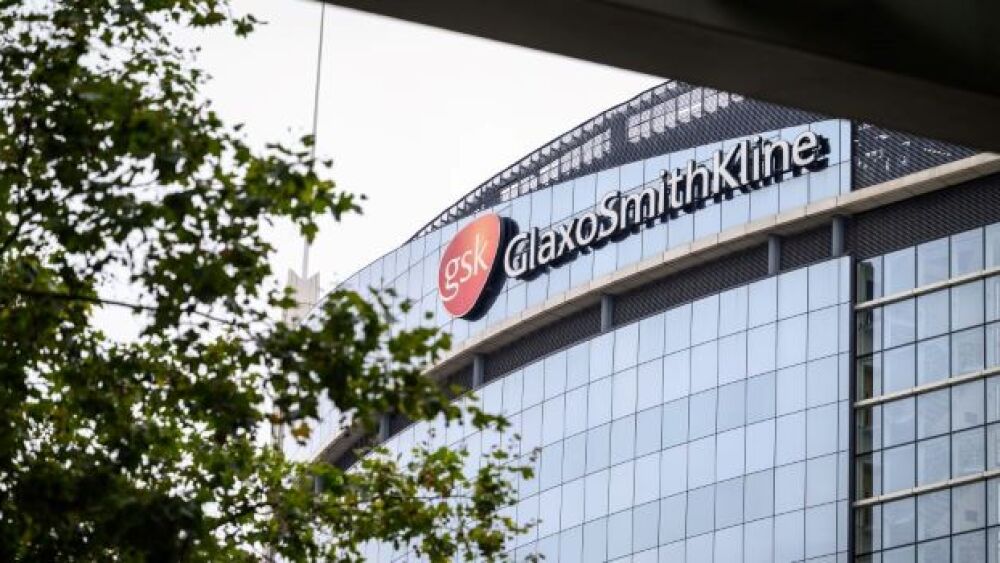GSK, whose shares were up about 3.3% Monday, will likely use part of the 7 billion pounds it will generate via the Haleon spinoff to make acquisitions.
Leon Neal/Getty Images
On Monday, the British pharmaceutical company formerly known as GlaxoSmithKline (now GSK) spun off its consumer health business as Haleon. The biggest listing to hit Europe in more than a decade, the standalone company includes brands such as Advil, Tums, Excedrin, Nicorette gum and Sensodyne toothpaste.
The deal has been in the works for a while, and earlier this month, it was reported that Haleon would carry more than $12 billion in debt when it was listed on the London Stock Exchange. In 2021, GSK’s Consumer Healthcare Business generated about $13 billion in sales and had a value of about $54 billion.
GSK fended off a bid for the consumer health business by Unilever, which CEO Emma Walmsley said “didn’t recognize the full value” of the business unit. Unilever had offered $59.52 billion (U.S.) for the company.
GSK’s Consumer Healthcare Business was a joint venture with Pfizer, with GSK holding 68%. In June, Pfizer announced plans to sell its stake in the new company to focus on innovative drugs and vaccines. However, it still holds its 32% stake, which it plans to sell off over time. GSK holds 13.5% of Haleon.
The remaining part of the U.K.-based giant, New GSK, will focus entirely on vaccines and prescription drugs. With the spinoff complete, all GSK shareholders will receive one share of Haleon for each GSK share they own. Haleon shares traded Monday on the London Stock Exchange at 330 pence ($3.924 U.S.).
“Ultimately the market is going to decide what the value of the company is, certainly on Day 1 of trading, and for the long term. This is a business that will create value for shareholders in the short, long and medium term,” Brian McNamara, CEO of Haleon, told CNBC.
McNamara chalked the price up to the current state of the market, saying, “It is a bit of a volatile environment, with inflation and other things that are happening in the world, but I feel like we are uniquely positioned in categories that really matter, with great brands to do well in any environment. So [I] feel good about the business and feel great about listing it today.”
GSK shares were up about 3.3% Monday. The company will likely use part of the 7 billion pounds it will generate via the Haleon spinoff to make acquisitions.
More M&A on Tap for New GSK?
In April, GSK completed its $1.9 billion acquisition of California-based Sierra Oncology. Sierra’s lead program is momelotinib, a late-stage drug for myelofibrosis patients with anemia. It is viewed as complementary to GSK’s Blenrep (belantamab mafodotin), which was approved two years ago as a monotherapy for adults with relapsed or refractory multiple myeloma who have received at least four previous treatments, including an anti-CD38 monoclonal antibody, a proteasome inhibitor and an immunomodulatory drug. If momelotinib is approved, GSK will launch it in the U.S. in 2023. Sierra submitted a New Drug Application to the U.S. Food and Drug Administration in June.
Although GSK has quite a few drugs and vaccines in development, one of the most promising is its vaccine against respiratory syncytial virus (RSV). In June, the company reported positive data from a pre-specified efficacy interim analysis of its Phase III trial, which included 25,000 participants across 17 countries. In a parallel trial, the vaccine, called AReSVi 004, induced strong humoral and cellular immune responses, which remained above pre-vaccination levels up to at least six months after the post-vaccination readout.
Mixed Reaction to “Lackluster” Haleon Launch
The Haleon listing was met with a mix of responses. Reuters, for example, called it “lackluster” with its market value of 30.5 billion pounds so far below that of the aforementioned Unilever offer. The Guardian, however, noted that this was “a litmus test to gauge the financial strength of the City of London and the appetite for new listings, with the company poised to join GSK on the FTSE 100 index of blue-chip shares.”
Victoria Scholar, the head of investment at Interactive Investors, noted, “Today’s listing is a win for the London Stock Exchange post Brexit, given that the U.K. stock market has been overly reliant on commodity and financial businesses.
However, for Haleon, there’s no doubt this is an extremely challenging time to come to market with this year’s equity market volatility that has led to a sharp decline in IPO activity. It is also a challenging time for the consumer health sector, given that inflation is close to double digits in the U.K. and in the U.S.”
In a sentiment that may work in Haleon’s favor, Scholar added, “However, consumer staples and healthcare are typically more recession proof than other sectors.”
Haleon has more than 22,000 employees across 170 markets. McNamara, the company’s CEO, joined GSK in from Novartis in 2015.





